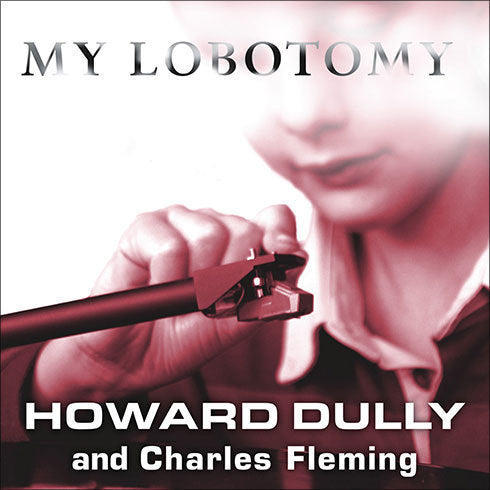
My Lobotomy
Read by
Johnny Heller
Release:
11/14/2007
Release:
11/14/2007
Release:
11/14/2007
Release:
11/14/2007
Runtime:
9h 2m
Runtime:
9h 2m
Runtime:
9h 2m
Unabridged
Quantity:
“The lobotomy, although terrible, was not the greatest injury done to him. His greatest misfortune, as his own testimony makes clear, was being raised by parents who could not give him love. The lobotomy, he writes, made him feel like a Frankenstein monster. But that’s not quite right. By the age of 12 he already felt that way. It’s this that makes My Lobotomy one of the saddest stories you’ll ever read.”
New York Times
A gut-wrenching memoir by a man who was lobotomized at the age of twelve.
Assisted by journalist/novelist Charles Fleming, Howard Dully recounts a family tragedy whose Sophoclean proportions he could only sketch in his powerful 2005 broadcast on NPR's All Things Considered.
"In 1960," he writes, "I was given a transorbital, or 'ice pick' lobotomy. My stepmother arranged it. My father agreed to it. Dr. Walter Freeman, the father of the American lobotomy, told me he was going to do some 'tests.' It took ten minutes and cost two hundred dollars." Fellow doctors called Freeman's technique barbaric: an ice pick–like instrument was inserted about three inches into each eye socket and twirled to sever connections from the frontal lobe to the rest of the brain. The procedure was intended to help curb a variety of psychoses by muting emotional responses, but sometimes it irreversibly reduced patients to a childlike state or (in 15 percent of the operations Freeman performed) killed them outright. Dully's ten-minute "test" did neither, but in some ways it had a far crueler result, since it didn't end the unruly behavior that had set his stepmother against him to begin with.
"I spent the next forty years in and out of insane asylums, jails, and halfway houses," he tells us. "I was homeless, alcoholic, and drug-addicted. I was lost." From all accounts, there was no excuse for the lobotomy. Dully had never been "crazy," and his (not very) bad behavior sounds like the typical acting-up of a child in desperate need of affection. His stepmother responded with unrelenting abuse and neglect, and his father allowed her to demonize his son and never admitted his complicity in the lobotomy; Freeman capitalized on their monumental dysfunction. It's a tale of epic horror, and while Dully's courage in telling it inspires awe, listeners are left to speculate about what drove supposedly responsible adults to such unconscionable acts.
Assisted by journalist/novelist Charles Fleming, Howard Dully recounts a family tragedy whose Sophoclean proportions he could only sketch in his powerful 2005 broadcast on NPR's All Things Considered.
"In 1960," he writes, "I was given a transorbital, or 'ice pick' lobotomy. My stepmother arranged it. My father agreed to it. Dr. Walter Freeman, the father of the American lobotomy, told me he was going to do some 'tests.' It took ten minutes and cost two hundred dollars." Fellow doctors called Freeman's technique barbaric: an ice pick–like instrument was inserted about three inches into each eye socket and twirled to sever connections from the frontal lobe to the rest of the brain. The procedure was intended to help curb a variety of psychoses by muting emotional responses, but sometimes it irreversibly reduced patients to a childlike state or (in 15 percent of the operations Freeman performed) killed them outright. Dully's ten-minute "test" did neither, but in some ways it had a far crueler result, since it didn't end the unruly behavior that had set his stepmother against him to begin with.
"I spent the next forty years in and out of insane asylums, jails, and halfway houses," he tells us. "I was homeless, alcoholic, and drug-addicted. I was lost." From all accounts, there was no excuse for the lobotomy. Dully had never been "crazy," and his (not very) bad behavior sounds like the typical acting-up of a child in desperate need of affection. His stepmother responded with unrelenting abuse and neglect, and his father allowed her to demonize his son and never admitted his complicity in the lobotomy; Freeman capitalized on their monumental dysfunction. It's a tale of epic horror, and while Dully's courage in telling it inspires awe, listeners are left to speculate about what drove supposedly responsible adults to such unconscionable acts.
Release:
2007-11-14
2007-11-14
2007-11-14
2007-11-14
Runtime:
Runtime:
Runtime:
Runtime:
9h 2m
9h 2m
9h 2m
9h 2m
Format:
audio
audio
audio
audio
Weight:
0.55 lb
0.0 lb
0.55 lb
0.5 lb
Language:
English
ISBN:
9781400105366
9781400175369
9798200140114
9798200140121
Publisher:
Tantor
Tantor
Tantor
Tantor
Praise
